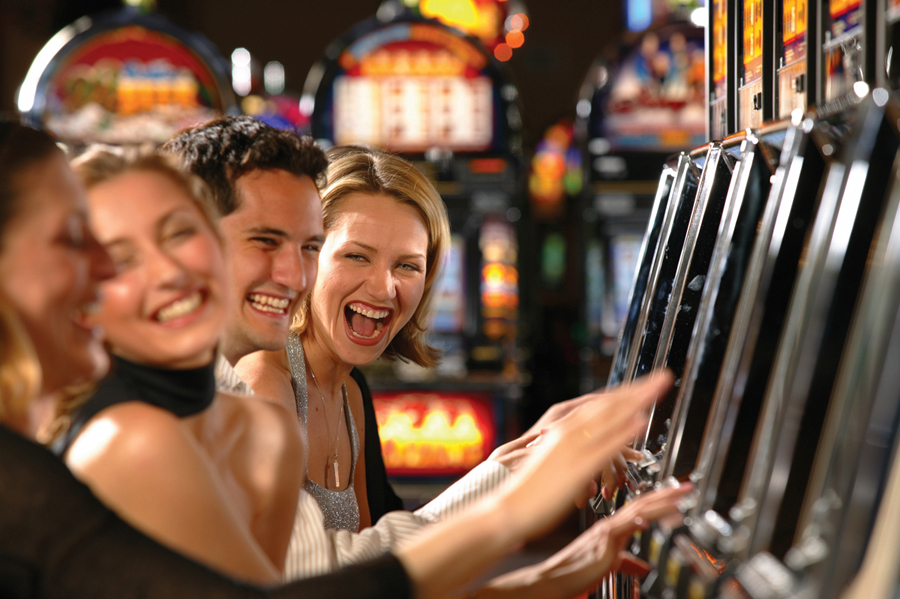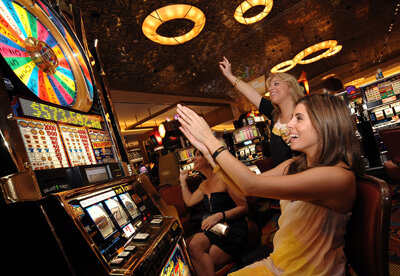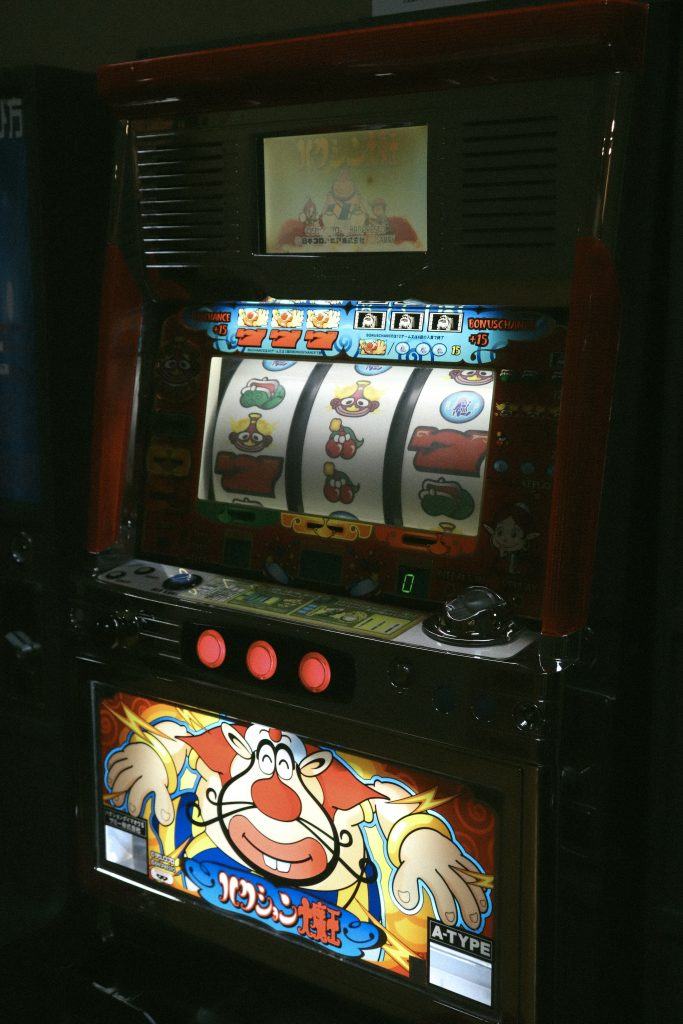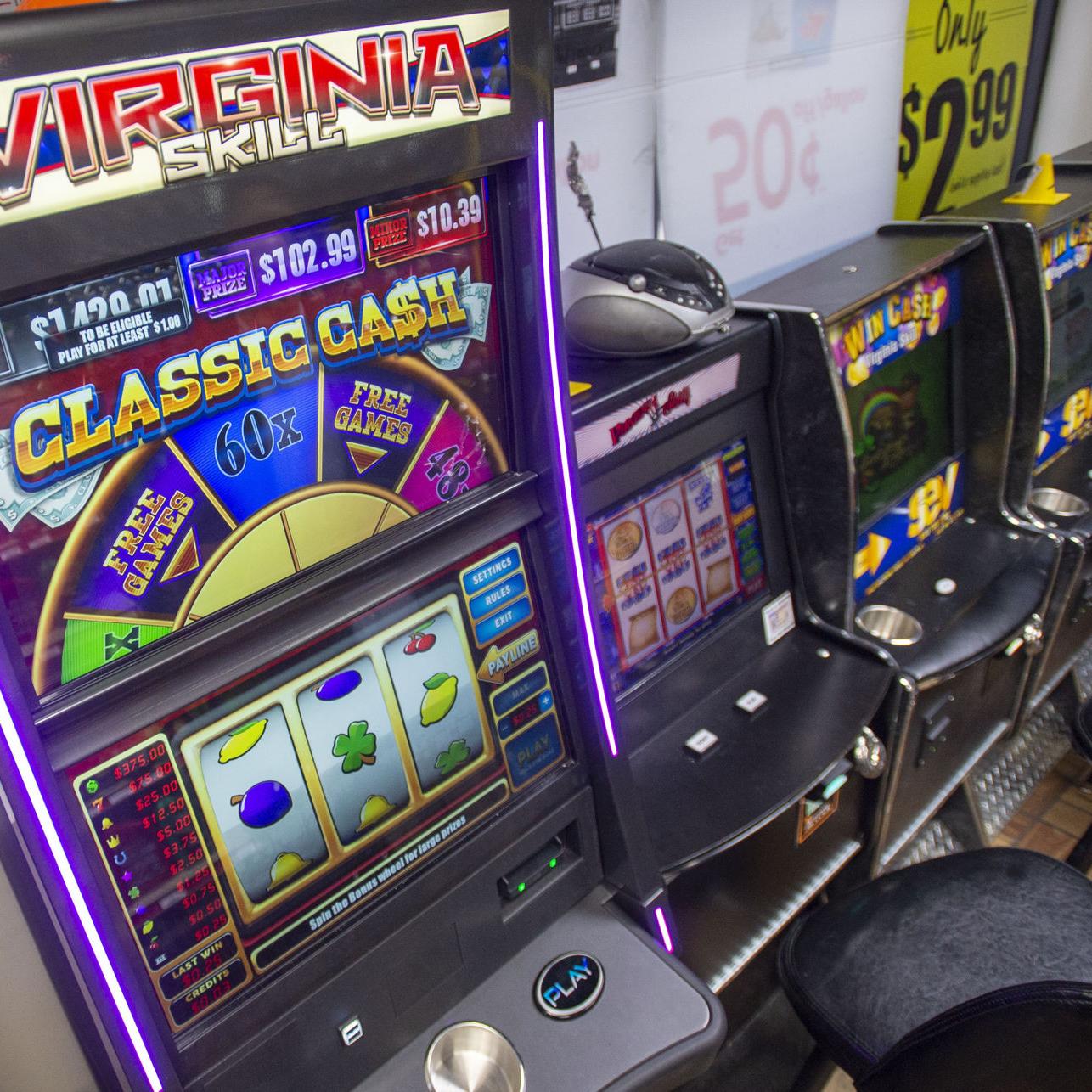Videos Of People Playing Slot Machines
For a game that’s so popular, the slot machine sure is a misunderstood device. You’ll find any number of “slot gurus” who will tell you the secrets of winning. They’re almost all wrong, by the way.You’ll also find plenty of well-meaning gamblers sitting in front of the machines willing to give you advice, too. They’re usually wrong, too. Even otherwise intelligent, competent people have weird ideas about slot machines.
Coronavirus and Playing Slot Machines at Casinos (Live Q&A) Jon Friedl - Professor Slots was live. 88ProBet is the preferred online betting sports and live casino in Singapore. We gained our Videos Of People Playing Hundred Dollar Wheel Of Fortune Slot Machines That French Lick Indiana Casino popularity through the creation of numerous online casino games, guaranteed payout when you win at any of our jackpot games, sportsbook betting, live casino games, horse and dog racing, and 4D TOTO. Slot Machines Don’t Change Their Odds to Catch Up After a Win, and They Don’t Become Due After a. The first tip that will help you to increase your chances of hitting a jackpot is to time the machines. “Time on Device” (TOD) is the #1 metric that casinos and slot machine manufacturers are.
I have a friend who’s one of the top salespeople in his company. He explained to me in detail how the slot machines are programmed to pay you out just enough to keep you interested and not quitting while you’re ahead. That’s sorta true, if you look at the situation with a squint and a certain slant.
I have a third friend who’s absolutely convinced that the casinos are outright cheating at every game but craps. There’s no reasoning with him. When I tried to explain to him how the math behind the games makes it unnecessary for the casinos to cheat, he explained to me that greed was the motive. I never did figure out why craps was the one game where the casinos don’t cheat.
Below, I’ve listed the 7 things that almost everyone gets wrong about slot machines. Knowing these things probably won’t help you win more often, but it’s always better to understand a game than to misunderstand it.
1- Slot Machines Don’t Change Their Odds to Catch Up After a Win, and They Don’t Become Due After a Cold Streak, Either
If you’re going to play slot machines, it’s a good idea to understand how the odds work. This won’t help you win more often, though. But it might prevent you from making bad decisions based on an erroneous premise.
Let’s use a simple slot machine as an example. It has 3 reels that spin, and each reel has 8 symbols on it. The symbols aren’t weighted in any specific way—they each have a 1/8 probability of coming up on a given spin.
The jackpot for this game is 500 coins. The probability of hitting that jackpot is the probability of getting 3 cherries in a row. When you’re calculating the probability of multiple events happening at the same time, you multiply the probabilities by each other.
The reason that you’ve lost money on this slot machine is because the payout odds are 500 to 1, while the odds of winning are 511 to win. That difference is the house edge. When you calculate predictions and estimates, you assume mathematically perfect results. As your real results approach infinity, they start to resemble the predicted results. But in the short run—over the course of a few spins, anything can happen. Every spin of the reels is completely random.

Also, on a real slot machine, you’d have multiple smaller jackpots, and the payout would be based on adding those possible jackpots up. Modern slot machines use a computer program called a random number generator to create their results. Since this is a computer program, the slot machine can weight some symbols to come up twice as often as others or 3 times as much as others.

An individual, though, won’t reach the long run for quite a while. This is why some folks come home from the casino a winner at the slots. Some people even come home winning fairly often. The casinos don’t care, because those people are the exceptions that prove the rule.
2- Casinos Don’t Change the Programming on Slot Machines Because of a Recent Win
Once you understand how a slot machine really works mathematically, it’s easy to see why it would be unnecessary for the casino to change the programming. Remember, the casino doesn’t mind if you win. Winning is baked into the math and advantage of the game.
No one would play slot machines if it were impossible to occasionally win.
So, no—the casinos don’t change the programming on individual slot machines after a recent win. It’s just not necessary. It would be more trouble than its worth.
It would even be counter-productive. The casino is looking at the big picture. Even a small casino has hundreds of gambling machines in it. A large casino with 5000 slot machines couldn’t be bothered re-programming individual machines after wins.
3- Using Your Players Club Card Doesn’t Impact Your Probability of Winning or Losing
The mechanism that tracks your play for the players club card doesn’t interact with the random number generator at all. The 2 program serve entirely different purposes. You need to understand the motivation behinds the players club card. The idea is that the casino is going to reward you with rebates and free food to motivate you to play the slot machines more often. They do this by crediting you with 0.2% or 0.3% of your action in your rewards account.
Slot Handpay Videos
There are legitimate reasons for not joining the slots club. For example, you might not want to share your personal information with the corporation that owns the casino. You might not want to receive advertising. You might not want “your buttons pushed” to encourage you to gamble.
Those are all excellent reasons for not joining the slots club. One of my best friends–one of the smartest gamblers I know–NEVER joins the slots club for those reasons. But thinking that you’ll be less likely to win because of the players club card is just nonsense.
4- Slot Machines with Progressive Jackpots Are Some of the Worst Games You Can Play
Some people love playing the progressive jackpot games. They love the idea of winning a single jackpot that could change their lives. It’s a lot like playing the lottery. The problem is that progressive slots, like the lottery, are incredibly hard to hit. Most people measure how “loose” a slot machine is by looking at its payback percentage—the amount of money you’ll get back compared to the amount of money you’ve gambled, expressed as a percentage.
How does this affect the payback percentage in a practical sense? You have to subtract the size of that jackpot from the payouts, which leaves you with a much lower payback percentage in real life than in theory. Also, think about how the casino funds the progressive jackpot. A tiny percentage of each wager is added to the jackpot. This reduces the payback percentage even further.
5-You Can’t Really Decide Where the Good Games Are Based on Their Location in the Casino
Apparently some so-called slot machine expert who used to work at a casino claimed years ago that you could find the “loose” slot machines on the edges of the banks, near the walkways. The theory was that they put the loose machines there to attract more customers.
That has since become a standard piece of slot machine “wisdom.” The problem is that if it was true in the past, it’s almost certain that it was only true at the casino where that guy worked. And even then, it was probably only true then. I can’t imagine it’s true now.
Hit frequency is a measure of how often a spin results in a win. The SIZE of the win is irrelevant to hit frequency. Some slot machines might have a hit frequency of 25%, others, 33%, and still others, 50%. But if a game has frequent small wins and the large wins are much less frequent, it could easily be a more expensive game in the long run than a game with a higher payback percentage and a lower hit frequency.
This is often especially true of penny slots. You can’t really play a penny slot machine for a single penny. They usually force you to bet on multiple paylines. The hit frequency is high enough on such games that you’ll almost always hit something on one or more of those paylines. But you usually win less than what you wagered.
6- You Can’t Make a Living Playing Slot Machines
I have a friend with a math degree who’s done computer programming for years. He’s also even done some search engine optimization work as a consultant for some major companies in some competitive industries. He’s a smart guy, and capable.
Here’s the problem with that theory:
Yes, a random number generator cycles through numbers one at a time. But that program cycles through thousands of numbers PER SECOND. When you hit the spin button on a slot machine, it stops instantly on that number. The spinning of the reels is just for show.
You can’t predict the cycle for the machine, because it’s running through the numbers too fast. If a slot machine stopped “thinking” of numbers every time you hit the spin button, you could certainly make a prediction. But that cycling goes on constantly, whether someone’s playing the game or not.

None of those strategies are a means of making a living on a reliable basis, though. If you want to make a living gambling, learn to count cards in blackjack. Or play poker professionally. Or handicap horses or bet on sports. Slot machines aren’t the ticket, though.
7- Playing Max Coins Isn’t Always the Best Strategy
When you’re playing video poker, you must always bet 5 coins—the max bet per hand. That’s because the top jackpot on a video poker machine pays out more. If you bet 1, 2, 3, or 4 coins, you get a 250 for 1 or a 200 for 1 payout on a royal flush. But if you bet max coin (5 coins), you get an 800 for 1 payout.

Here’s how you estimate and predict the amount of money you’ll lose per hour playing a slot machine game:

You multiply the number of spins per hour you’re going to make by the amount you’re betting per spin. You multiply that amount by the game’s house edge. An average slot machine player might make 600 spins per hour. (Even when I purposefully play slowly, I get in 400 spins per hour—I’ve clocked it.) If you’re playing on a quarter machine and making a max coin bet of 5 coins, you’re putting $1.25 per spin into action. That’s $750/hour.
If the game has a reasonably low house edge of 5%, your expected loss is $37.50/hour. If you could play that same game for only a single coin per spin, though, the amount of money you’d put into action per hour would be $150. Your expected loss would only be $7.50/hour. You might get bored putting so little money into action on a slot machine spin. Some gamblers need to have a big enough amount of money on the line to keep it interesting, but not all of them. Everyone has a different budget.
If she can bet that quarter per spin and get the same payback percentage, she should do so. She’ll lose less money on the slot machines in the long run. Learn how to read the pay tables, so you can distinguish between the games where you should bet max coin and the games where it doesn’t matter.
Conclusion
There’s hardly enough space in a single blog post to cover all the misinformation that gets spread about slot machine games. I’ve covered some of the biggest and most blatant falsehoods that get spread in this post. If you leave this post understanding only a couple of things, it should be these:
Every spin of the reels is an independent, random event. You can’t predict what a slot machine is going to do based on what it’s done previously.
No one can get an edge playing slots. It’s just not possible, no matter what some people might claim. They might have had a lucky streak and drawn some erroneous conclusions, though.
Watching People Play Slots
You can’t figure out which slot machines are “loose” versus which slot machines are “tight.” In the short run, the results can be so varied that it’s just impossible to tell.
Slot machines can be fun, but if you’re going to gamble, you should probably choose casino games which have a lower house edge. Those can often be just as much fun as slots, but they cost a lot less to play in the long run. Video poker offers a similar experience, but even the worst video poker games with the worst pay tables offer better odds than slot machines.
Most research on compulsive gambling focuses on the psychological, biological, or even moral profiles of gambling addicts—but the real problem may be the slot machines. MIT anthropologist Natasha Dow Schull recently won the American Ethnological Society’s 2013 First Book Prize for her new work, Addiction by Design: Machine Gambling in Las Vegas, which explores the relationship between gamblers and the technologically sophisticated machines that enable—and encourage—them to bet beyond their means. Schull, who spent fifteen years conducting ethnographic research in casinos, gambling industry conventions, and Gamblers Anonymous meetings in Las Vegas, explained to me over the phone, “Addiction is a relationship between a person and an activity, and I see my book as compensating for the lack of research into the object side of the relationship. With alcohol research, for instance, there has been a focus not only on the alcoholic but on the alcohol itself. With gambling, the focus is most often on the person. It’s essential to broaden that.”
Alice Robb: Why should a cultural anthropologist study gambling?
Videos Of People Playing Slot Machines In Casino
Natasha Dow Schull: Games are a great window into culture. They indicate what the populace is anxious about or is seeking out. The fact that people are being drawn to individual machine consoles rather than high-volatility, intense social games tells us a lot about the risk and volatility that people feel in the world, in their lives—think of the financial crisis, the culture of fear around terrorism, the environment, global warning. It makes sense that people would seek out games that allow them a sense of control and predictability.
You don’t think about gambling as that kind of a game. You would think it’s about thrill and risk, but actually slot machines provide people with a sense of safety and certainty.
In 1967, the anthropologist Erving Goffman described gambling as the occasion for “character contests” in which participants could demonstrate their courage, integrity and composure under pressure. Today, our anxieties are very different, and with slot machines we’re seeking a sense of safety and routine—the opposite of what Goffman describes.
AR: How does gambling promote a sense of security? Isn’t gambling about risk?
NDS: When gamblers play, they’re going into a zone that feels comfortable and safe. You’re not playing to win, you’re playing to stay in the zone— a zone where all of your daily worries, your bodily pains, your anxieties about money and time and relationships, fall away.
One addict I interviewed described being in the ‘zone’:
It’s like being in the eye of a storm…Your vision is clear on the machine in front of you but the whole world is spinning around you, and you can’t really hear anything. You aren’t really there—you’re with the machine and that’s all you’re with.”
New kinds of machines are key. With multi-line slot machines, say you put in a hundred coins. If you’re betting on 100 lines of play, you’ll always ‘win’ something back. If you put in 40 coins and get 30 back, that’s a net loss, a ‘false win’, but the machine responds as if you’ve won: The lights go off, you get the same audiovisual feedback. Almost every hand, you get the same result— there are no dry spells.
AR: You say that people want to get away from their fears about money and people. So why escape by spending money in a casino that’s full of people?
NDS: In order to get away from the burdens and anxieties associated with monetary value and interactions with other people, you have to work within those mediums and convert them into something else. To get away from money, you have to play with it; gamblers spoke about how money became currency for staying in the zone.
And even though there are people around, it’s still very anonymous. You set yourself up alone in a machine-like pod and everything blurs away—the other people are just a kind of necessary background. People seem not to be able to do that on the couch alone. A lot of the gamblers I talked to would play on hand-held machines at home in between their sessions at the casinos, but they couldn’t achieve that zone as readily.
AR: Why are slot machines so much more addictive than more traditional forms of gambling?
Watching People Play Slot Machines
NDS: Even though slot machines are considered to be a light form of gambling due to their relatively low stakes, ease of play and historical popularity with women, they are actually the most potent. There are three reasons why: Playing on slot machine is solitary, rapid, and continuous. You don’t have interruptions like you would in a live poker game, waiting for cards to be dealt or waiting for the other players. You can go directly from one hand to the next—there’s no clear stopping point built into the game. You don’t even have to stop to put bills in the machine; the machines take credit or barcoded tickets.
AR: What do new gambling machines say about our relationship with technology?
NDS: The cultural history of gambling in this country follows alongside technological advances—not only because technology make these new kinds of machines possible, but because we’ve become comfortable interacting with and even trusting computers and machines.
Slot Machines On Youtube
You can see that in the revenue: 80 percent of revenue in Las Vegas comes from individual encounters with slot machines rather than social forms of play around a table. Whereas in a place like Macao—which has far greater revenue from gambling than Las Vegas—it's the exact opposite: 80 percent is coming from table games, because people have a distrust of computers and machines.
AR: How could your work affect the public conversation on gambling?
Slot Machine Players On Youtube
NDS: States around the country are considering gambling as way to increase revenue in the recession—and it’s the revenue from machines that they’re anticipating. I think this is a very dubious proposition since, as I show, these devices are so clearly problematic. Machines are designed to draw people in and sometimes do so in deceptive ways; their design affects all players, not just a small group of addicts. Legislators need to understand how these machines work.